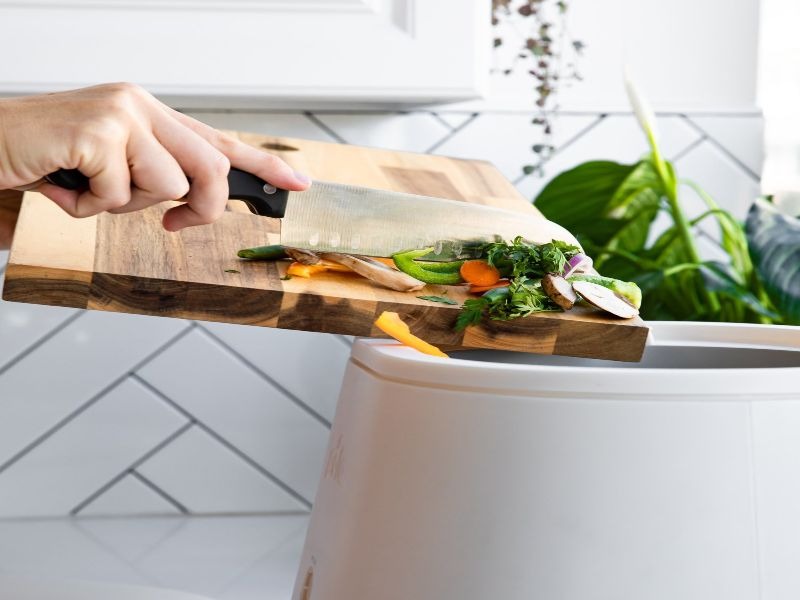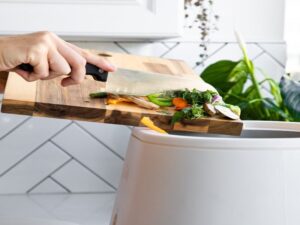High-Tech Waste Management: How A Smart Kitchen Composter Simplifies Eco-Living
Managing food scraps at home used to be a hassle: smelly bins, inconsistent results, and a lot of guesswork. But...

Managing food scraps at home used to be a hassle: smelly bins, inconsistent results, and a lot of guesswork. But things have changed. A smart kitchen composter can now handle that mess with less effort, all while helping you live more sustainably. These devices are making composting easier, faster, and more accessible for all kinds of households.
What Is a Smart Kitchen Composter?
A smart waste kitchen composter is a compact, high-tech appliance that breaks down food waste into compost right in your kitchen. These units typically sit on your countertop or under the sink and work much faster than traditional compost piles. Most models use a combination of heat, grinding, and drying to reduce scraps into fine, nutrient-rich material.
Some even connect to smartphone apps so you can monitor progress, track how much waste you’ve diverted from landfills, or get alerts when the bin is full.
Why More Households Are Choosing Tech-Driven Composting
Convenience is a huge reason. Traditional composting requires an outdoor space, frequent turning, and patience. With a smart waste kitchen composter, you don’t need a garden, and you don’t need to wait weeks or months for results. The process is typically done within hours.
Here’s what else makes them appealing:
- Odor Control: Sealed units with carbon filters help eliminate smells.
- Speed: Some models finish the composting cycle in under a day.
- Compact Design: Built for countertops, these devices work in apartments or small homes.
- Quiet Operation: Most operate quietly, making them kitchen-friendly.
These features allow people who live in cities or have limited outdoor space to still participate in composting.
What Can You Put in a Smart Composter?
Smart composters handle most common food scraps, including:
- Fruit and vegetable peels
- Coffee grounds and tea bags
- Bread and grains
- Small bones (in some models)
- Cooked leftovers (in limited amounts)
Avoid adding things like large bones, excess oil, or non-food items like plastics or wrappers. Many smart composters include clear guidelines to make it simple.
Real Benefits You’ll Notice
The results go beyond just less food waste. Here are a few everyday benefits users often see:
- Smaller trash loads: Fewer full garbage bags mean fewer trips to the bin.
- Healthier plants: The resulting compost can be used for raised beds, planters, or houseplants.
- Lower carbon footprint: Reducing food waste helps cut down on methane emissions from landfills.
- Cleaner kitchens: These machines keep food scraps contained and odor-free until processing.
Additionally, the compost created can help reduce your reliance on chemical fertilizers.
Choosing the Right Smart Composter
There are many models on the market, so here are a few features to look for:
- Processing time: Faster is better if you cook often.
- Capacity: Pick a size based on how many people live in your household.
- Ease of cleaning: Look for units with dishwasher-safe components.
- Energy use: Some models are designed for low power consumption.
- Noise level: Check product specs or reviews if quiet operation is important.
Also, be sure to check the warranty and customer support options, especially for high-use devices.
Setting Up Your Smart Composting Routine
Here’s how to get started:
- Place your composter on a flat, stable surface.
- Add scraps throughout the day or week.
- Start the composting cycle when full.
- Remove the finished compost and clean the unit as needed.
Most smart composters also allow you to pause or restart the cycle with a single button press or app command. The key is to build composting into your daily routine so it becomes second nature.
Making the Most of Your Compost
Once your composter finishes its cycle, you’re left with a dry, crumbly mix that’s perfect for use in your garden. Add it to:
- Raised garden beds
- Potted plants
- Lawn patches
- Outdoor planters
You can also store the compost for later use. Some people even offer extra compost to neighbors or local gardening groups.
Final Thoughts
The smart kitchen composter is a solid choice for anyone looking to manage waste more efficiently. It takes the guesswork out of composting and delivers results quickly, cleanly, and with minimal effort. With the rise of compact, tech-forward models, more households are seeing that it’s possible to compost indoors, without turning their kitchen into a science project.
If you’re interested in reducing waste while helping your plants thrive, a smart waste kitchen composter could be the upgrade your home needs.




